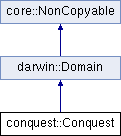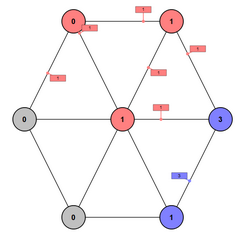Domain: Conquest, a two-player strategy game. More...
#include <conquest.h>

Public Member Functions | |
| size_t | inputs () const override |
| Number of inputs to a Brain. | |
| size_t | outputs () const override |
| Number of outputs from a Brain. | |
| bool | evaluatePopulation (darwin::Population *population) const override |
| Assigns fitness values to every genotype. More... | |
 Public Member Functions inherited from darwin::Domain Public Member Functions inherited from darwin::Domain | |
| virtual unique_ptr< core::PropertySet > | calibrateGenotype ([[maybe_unused]] const Genotype *genotype) const |
| Optional: additional fitness metrics (normally not used in the population evaluation, ie a test set) | |
Detailed Description
Domain: Conquest, a two-player strategy game.
Conquest is an minimalistic real-time strategy game. It’s a two-player game, and the "board" is a graph of connected nodes. A node can be captured by "attacking" with more units than the “defending” units controlling the node. A controlled node automatically generates new units at a fixed rate (up to a specified cap, ex. 10 units). The goal of the game is to capture all the nodes.

All the population members participate in a tournament and the outcomes are used to calculate the individual fitness values.
Inputs
| Input | Value |
|---|---|
| [N] | the number of units in each node |
| N + 2i | deployment[i].position |
| N + 2i + 1 | deployment[i].size |
Where:
- N is the number of nodes in the board graph
- i = [0..A), A = number of directed arcs in the graph
- Deployment position (distance from the source node)
- The number of units and deployment sizes are negative if they are opponent's units
Outputs
| Output | Value |
|---|---|
| [A] | preference for initiating an attack on the corresponding arc |
The largest output signal, if greater than kOutputThreshold, indicates the intention to initiate an attack on the corresponding arch. The attack order is valid only if the source node is controlled by the player. An attack sends a configurable percentage of the units (g_config.deploy_percent) along the selected arc.
Member Function Documentation
◆ evaluatePopulation()
|
overridevirtual |
Assigns fitness values to every genotype.
Having a good fitness function is a key part of evolutionary algorithms:
- Perhaps obvious, the fitness value should accurately estimate the quality of a particular solution
- A "smooth" distribution is preferable since it provides a gradient which can guide the incremental search in the solutions space. (ex. if most fitness values are 1.0 or 0.0 it's hard to know which genotypes are good candidates for reproduction)
- Returns
trueif the evolution goal was reached
Implements darwin::Domain.
The documentation for this class was generated from the following files:
- C:/Users/lemo/work/darwin/domains/conquest/conquest.h
- C:/Users/lemo/work/darwin/domains/conquest/conquest.cpp
 1.8.14
1.8.14